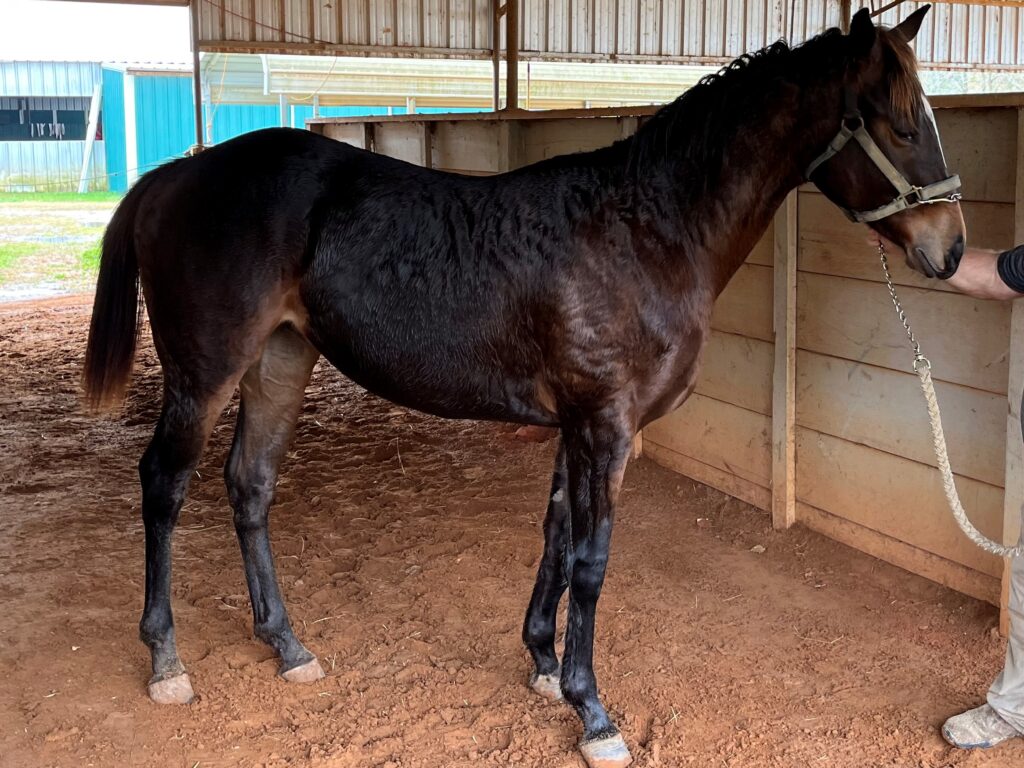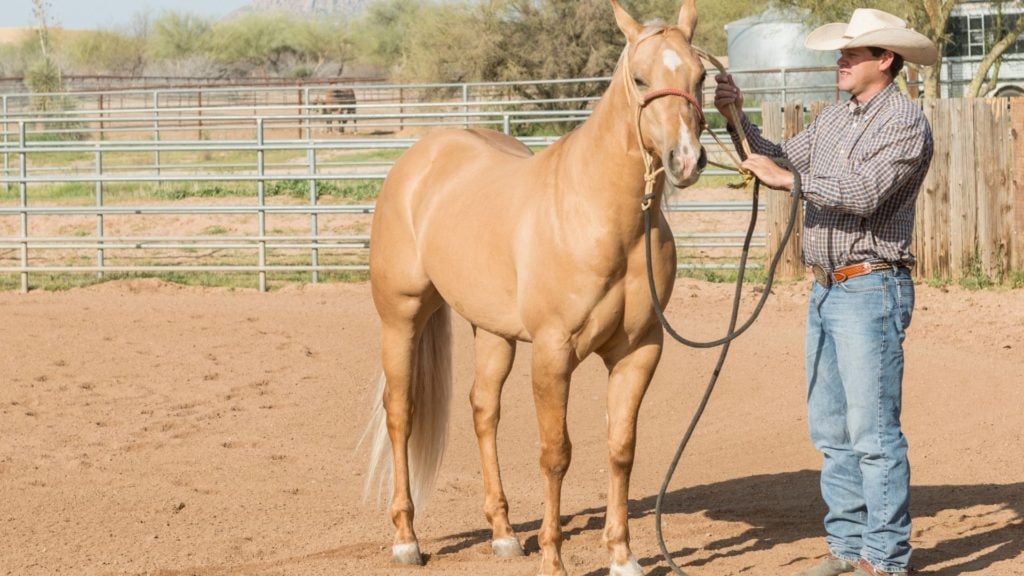Last updated: December 6, 2022
Recently a trainer took a horse to the LSU vet clinic for surgery, and before the procedure, they told us how much the horse weighed. We were stunned. It weighed way more than either of us could have guessed. Which made me wonder, what does an average horse weigh?
An adult horse’s average weight is estimated to be 1,000 pounds, but it varies by breed, age, fitness level, and height. It’s nearly impossible to calculate a precise average horse weight considering the number of horses and breeds globally; it could be anywhere from 900 to 1350 pounds.
Do you have a horse? If so, how much does it weigh? You may be surprised to learn that the answer is not as straightforward as you might think. There are a lot of factors that go into calculating how much a horse weighs, including breed, sex, and age.
In this comprehensive guide, we will break down all of the different factors that contribute to a horse’s weight. So whether you are just curious about horses or are in the process of buying one, read on for everything you need to know about horse weights.

Average Adult Horse Weight by Breed
| Horse Breed | Average Weight |
|---|---|
| Arabian | 900 pounds (408.23 kg) |
| Thoroughbred | 1,100 pounds (498.95 kg) |
| American Quarter Horse | 1,000 pounds (453.5 kg) |
| Akhal-Teke | 900 pounds (408.23 kg) |
| American Paint Horse | 1,000 pounds (453.5 kg) |
| Paso Fino | 850 pounds (385.55 kg) |
| Standardbred | 950 pounds (430.91 kg) |
| American Saddlebred | 1,000 pounds (453.5 kg) |
| Hackney Horse | 1,000 pounds (453.5 kg) |
| Mustang | 900 pounds (408 kg) |
| Haflinger | 850 pounds (385.55 kg) |
| Missouri Fox Trotter | 1,050 pounds (476.272 kg) |
| Tennessee Walker | 1,100 pounds (498.95 kg) |
| Morgan | 950 pounds (430.91 kg) |
| Polo Pony | 1,050 pounds (476.272 kg) |
| Fjord | 950 pounds (430.91 kg) |
| Hanoverian | 1,400 pounds (635.02 kg) |
| Dutch Warmblood | 1,430 pounds (648.63 kg) |
| Danish Warmblood | 1,200 pounds (544.31 kg) |
| Oldenburg | 1,500 pounds (680.5 kg) |
| Westphalian | 1,320 pounds (599 kg) |
| Trakehner | 1,200 pounds (544.31 kg) |
| Friesian | 1,200 pounds (544.31 kg) |
| Selle Français | 1,300 pounds (589.67 kg) |
| Irish Cob Horses | 1,300 pounds (589.67 kg) |
| Andalusian | 1,200 pounds (544.31 kg) |
| Lipizzaner | 1,150 pounds (521.63 kg) |
| Lusitano | 1,400 pounds (635.02 kg) |
| Wielkopolski Horse (Polish Warmblood | 1250 pounds(566.99 kg) |
| Swedish Warmblood | 1025 pounds (464.93 kg) |
| American Warmblood | Weights vary greatly |
| Clydesdale | 1,900 pounds (861.82 kg) |
| Percheron | 1,950 pounds (884.50 kg) |
| Belgian | 2,000 pounds (907.18 kg) |
| Suffolk Punch | 1,900 pounds (861.82 kg) |
| Shire | 2,000 pounds (907.18 kg) |
| Ardennes | 1,800 pounds (839.14 kg) |
| Worlds Largest Horse (Shire) | 3,359 pounds (1523.61 kg) |
Average horse weight by Classification
| Type | Weight | Classification |
|---|---|---|
| Average adult horse | 1,000 pounds | |
| Heaviest horse ever | 3,359 pounds | Cold-blood (Shire) |
| Lightest horse ever | 57 pounds | Miniature |
| Average draft horse | 1,400 to 2,000 lb | Cold-blood |
| Average Warmblood | 1250-1450 pounds | Warmblood |
| Miniature horse | 100 to 350 pounds | Miniature |
| Baby Horse (foal weight) | 50 pounds | foal |
| Average Pony | 400 pounds | pony |
Factors that impact a horse’s weight
A horse’s weight is determined by a number of factors, including the breed of the horse, its age, and how much it exercises. It’s important to be aware of these factors when you are trying to keep your horse at a healthy weight.
There are many types of horses, such as draft horses, pleasure horses, and sport horses, so it’s challenging to calculate an average horse weight? But we provide information on the average weights for different horse breeds and how you can determine your horse’s weight.
Horses vary in weight based on their breeds and due to age, feed, and activity. Quarter horses typically won’t weigh the same as a Clydesdale or Belgian. And not all quarter horses have the same build. The ones used in halter shows are large and heavily muscled.
On the other hand, a racing quarter horse is lean and finer-boned. Horse weight also varies by season. During winter, horses experience a drop in weight because their body uses calories to remain warm.
In summer, horses have an abundance of grass to chew. So, they put on more weight. Some horses even have to be put in a muzzle so that they stop eating grass!
Breed
Some horse breeds have more muscle and denser bones than others. This is due to the fact that different breeds have been selectively bred for different purposes over time.
For instance, a racehorse has been bred for speed and agility, while a draft horse has been bred for strength and power. This means that there are variations in the weight of different horse breeds.
One of the first things you need to consider when calculating a horse’s weight is its breed. Different breeds of horses have different body types and weights. For example, a Quarter Horse typically weighs in at around 1000 pounds, while large draft horse breeds such as the Shire may weigh as much as 2500 pounds.
Gender
Another important factor to consider is a horse’s sex. It’s a bit of a surprise to many people, but it’s actually quite common in the animal kingdom. Male horses typically weigh between 10 and 20 percent more than their female counterparts.
There are a few different theories out there as to why male horses tend to weigh more than females. One theory is that testosterone plays a role in weight gain.
Testosterone is known to increase muscle mass and promote fat storage, so this could account for the greater weight difference between males and females.
Whatever the reason may be, the fact remains that male horses tend to weigh more than females. But don’t forget to consider breed, a male Arabian, for example, may only weigh 600 pounds, while a female Clydesdale could weigh up to 1800 pounds.

Age
One of the most important factors when determining a horse’s ideal weight is age. Horses age differently, and as they get older they often require less food to stay healthy. This doesn’t mean that you should starve your elderly horse – just that you may not need to feed him as much as you would a younger one.
Also, when you calculate how much a horse weighs it’s important to consider its age. Young horses (under one-year-old) weigh less than older horses. And as horses get older some of them begin to wither or lose muscle mass. This is especially true of horses that are no longer used for work.
Diet and Exercise
You should consider diet and exercise when evaluating your horse’s weight. Diet is an important factor when it comes to managing your horse’s weight. Horses that are ridden or worked regularly will naturally be leaner but have more muscle and therefore weigh more than those that aren’t exercised or fed a nutritious diet.
This is because horses that pull carts or wagons or perform other strenuous tasks, develop more muscle mass over time. Conversely, horses who spend most of their days lounging in a field will have less muscle mass and thus weigh less.
Therefore, you should adjust your horse’s ideal weight accordingly. When feeding to put weight on your horse, provide a balanced diet that consists of hay, grains, and supplements. It is also important to make sure they have access to clean water at all times.
How much does the average horse weigh?
An average horse weighs somewhere between 1000 and 1500 pounds. But as we’ve seen, there can be quite a bit of variation based on breed, sex, and age. So if you’re curious about the specific weight of your horse, it’s best to weigh it yourself or check with your vet.
How can you measure your horses’ weight?
Now that you have some idea about a horse’s average height, you may be wondering how you can weigh your horse. After all, you can’t ask them to step on your bathroom scale!
There are four ways in which you may measure a horse’s weight.
- Eyeballing
A horse’s owner or a veterinarian relies on a horse’s experience to guess its weight. Relying on your eyes to determine your horse’s weight is the most common and most inaccurate way of measuring a horse’s weight.

While they think they are making an educated guess, they can be off by as much as 200 pounds.
- Weighing Scale
The most accurate weight measurement comes from a scale. However, weighing scales for horses are not readily available.
A suitable replacement can be public weight scales for weighing truck payloads, which are available along highways.
You can park a trailer with your horse in it on the scale, then return sometime later, and weigh the empty trailer. The difference between the two values is the horses’ weight.
- Weight Tape
There are weight tapes available in the market that can be used to measure a horse’s weight. These measuring tapes have units of pounds instead of inches.
They are designed for average-sized, adult horses, who are around 1000 pounds heavy and 16 hands tall.
They are a great way of arriving at an approximate weight for your horse and tracking the changes in their body weight with time.
To measure your horse, you will have to make sure it is standing over a flat surface.
Holding the zero end of the tape, you pass the tape over the horse’s back, just behind the withers. You will then grab the tape and pass it under its barrel, right where the gird usually goes.
Bring the tape to meet the zero end. The reading will give you the horse’s weight.
Make sure that you neither leave the tape too loose nor tighten it too much.
The reading will be most accurate when your horse is relaxed. For a better result, take three measurements and then take out their average.
You can find a weight tape here that’s designed for measuring horses.
- Weight Calculations
Using formulas to calculate weight is my favorite method of measuring a horse’s weight and one that I frequently use. It involves two measurements and one formula. This time, the measurements will be in inches.
As before, you will ensure the horse is standing on a flat, even surface and measure its heart girth, following the guidelines given in point 3. Then, you will need to measure the horse’s length.
Place the end of the tape at the point of the shoulder and measure to the buttocks point. Then, put the values in the formula below:
Weight of Horse = (Heart Girth x Heart Girth x Body Length) / 300
Assume your horse has a girth measurement of 75 inches and its length is 63 inches; it would weigh approximately 1,181 pounds. 75x75x63=354,375. Now divide it by 300, and you have the horse’s weight, 1,181 pounds.
This formula will give you the weight of an adult horse. For calculating the weight of a yearling, replace 300 with 301. For a pony, replace it with 299.
All four methods will get you the horse’s weight, with varying levels of accuracy. I recommend the last two methods since they are cheap, convenient, and reliable.
Body Condition Score
There is yet one more way to check whether your horse is at the ideal body weight. This system is called the Henneke Scoring System.
It relies on close examination of the horse’s body parts and ranking them from 1 to 9 based on accumulated fat, with 1 being very thin and 9 being obese.
The ribs, withers, neck, shoulder, loin, and tailhead are assessed visually and through feeling with the hand.
The average of the six scores will give the final score.
Generally, 5 is the ideal score.
Interesting Facts about horses’ weight
- A horse’s head weighs 10% of its body weight.
- When a mare gives birth, the foal weighs 10% of her body weight, regardless of breed.
- A horse acquires 90% of its body weight during the first two years. It takes two more years to gain the remaining 10% weight.
- The heaviest horse in the world was Sampson (or Mammoth), weighing at 3,359 pounds.
- The lightest horse in the world was Thumbelina, who weighed 57 pounds.

How much does a quarter horse weigh?
The American Quarter Horse weighs between 900 and 1250 pounds. Generally, Quarter Horses aren’t tall. That means their weight comes from their bone density and powerful muscles.
Quarter horses are broad in the shoulder, barrel, and in their haunches. They also have thick, muscular bodies, which gives them great strength and substantial bodyweight.
There is a variation in the weight of Quarter Horses based on their body types.
- The Bulldog Quarter Horse which is the heaviest type of quarter horse weighs between 1150 to 1350 pounds.
- The Semi-Bulldog Quarter Horse weighs between 1050 to 1250 pounds.
- The Progressive Quarter Horse weighs 1150 and more.
- The Running Quarter Horse (which resembles Thoroughbred horses) weighs 1,100 pounds and more. However, I’ve known some running quarter horses that were much lighter.
Quarter Horses are a versatile breed with many qualities that make them an excellent choice for experienced riders.

How much does a Thoroughbred weigh?
Thoroughbreds are known for being one of the fastest breeds, with an average weight of between 1000 and 1100 pounds. They are bred for speed and are primarily used for horse racing.
Thoroughbreds start racing at the age of 2 when their bodies are not yet fully developed. As they age, their weight increases since they spend a lot of time building muscle through exercise and eating high-quality feed and hay.
With long legs, a broad chest, and refined heads, thoroughbreds have a light build, which helps enable them to run fast.
How much does a 16-hand horse weigh?
A 16-hand horse can weigh anywhere between 1036 and 1653 pounds, depending on its breed and height. A sixteen-hand Thoroughbred weighs much less than a sixteen-hand Suffolk Punch.
But on average, at 16 hands, you can expect a horse to weigh between 1036-1543 pounds, whereas, at 16.2 hands, it is 1080-1653 pounds.
Some horses that can be 16-hands tall include the American Quarter Horse, Thoroughbreds, Andalusian, Appaloosa, Belgian, Cleveland Bay, Clydesdale, and Suffolk Punch.
Why is it important to know your horses’ weight?
I once had a horse who kept on getting thinner. At first, I didn’t notice my horse dropping weight because I failed to regularly measure and keep up with his weight.
However, when the weight changes became apparent, I took him to the vet and found out that he had dental problems. His wolf teeth had developed sharp edges that were preventing him from eating properly.
The vet advised me to regularly measure my horse’s girth or weigh him so I’ll be able to notice weight fluctuations before they get too serious. The point of telling this personal anecdote is that monitoring your horse’s weight helps you keep a check of its health.

If your horse is gaining weight, you will need to adjust its feed as obesity can lead to many complications. Horses generally need to eat 1.5-3% of their body weight.
For example, if your horse weighs 1200 pounds, it will need 18 to 36 pounds of food. After using the horse’s weight to arrive at an estimate, you can confidently decide how much you should feed of hay and grain, based on its activity level.
It’s also critical to know your horse’s weight so you don’t overburden it. A horse can safely carry 20 percent of its body weight. Putting too much weight on your horses can hurt them.
FAQ
How long is a horse?
An average horse is about eight feet long, from the tip of its nose to its tail. Of course, some horses will be longer and others substantially shorter.
Does a horse weigh a ton?
Yes, some horses do weigh a ton. A ton is 2,000 lbs, and many large draft horse breeds weigh 2,000 lbs. and more.
How much does a pony weigh?
Most weigh between 500 and 700 lbs. However, there is a wide weight range between pony breeds.
Related articles:

About the Author: Miles Henry
Lifelong Horseman | Racehorse Owner | Published Author
Miles Henry brings over 25 years of hands-on experience training and owning Thoroughbred racehorses. Raised with Quarter Horses and Appaloosas, he’s spent a lifetime learning from horses—on the track, in the barn, and in the field. Today, he runs a small but successful racing stable in Louisiana and shares real-world insights on HorseRacingSense.com, helping horse owners, fans, and bettors navigate the sport with confidence.
📚 Books: View Miles’s books on Amazon »
🎧 Podcast Guest: Animal Tales Ep. 32 |
YouTube Interview
📩 Newsletter: Sign up for racing tips and horse care advice »
🔗 Follow Miles:
Twitter |
Facebook |
YouTube


